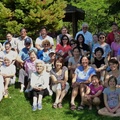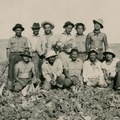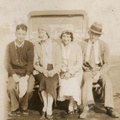Japanese Americans have heard about how non-Japanese helped some JA families during World War II. On Bainbridge Island, where I grew up, Walt and Millie Woodward (owners/publishers of the only newspaper to oppose JA incarceration) and Felix Narte (who helped save the Kitamotos’ berry farm), are well known. On a more regional level, Wayne Collins is famed for the years he spent restoring US citizenship to Nisei who renounced it and “returned” to Japan, only to find that they had made a grave error under duress.
There certainly weren’t enough such kindly people. But many remain unknown. One of these previously unheralded benefactors was a Sephardic Jew who lived in Seattle. The graphic novel, We Are Not Strangers, is a fictional tale based on that true story.
Sephardic Jews originated mainly in Mediterranean areas. They first came to Seattle shortly after the dawn of the 20th century. A few years later, Pike Place Market began.
Sephardic Jews quickly became dominant wholesalers and retailers of fish and produce at the Market. Yet speaking Ladino rather than Yiddish, they found it difficult to communicate with Seattle’s other Jewish population, the Ashkenazi, who came mainly from central and eastern Europe.
Sephardic Jews and JAs faced some of the same issues. They first arrived in Seattle just a few years apart. Many of them worked at the Market. They each spoke a language that hardly anyone else knew. Many Sephardic Jews looked “different”, as did JAs. As a result, both faced discrimination.
Josh Tuininga belongs to one of Seattle’s Sephardic Jewish families. One day, his uncle told him about Asians who showed up at his grandfather’s funeral. No one in the family knew who they were, nor why they were there. Author/artist Tuininga knew he needed to find out.
He discovered that the Asians who attended his uncle’s grandfather’s funeral were JAs whom the grandfather had helped during WWII. Inspired by this true story, Tuininga wrote and illustrated We Are Not Strangers.
The main character in the book is Marco, a first-generation Sephardic Jewish immigrant living in Seattle. Marco often goes fishing on a Seattle pier. There he meets a fellow fisherman, Nisei Sam Akiyama. They become friends.
Then Pearl Harbor is attacked. In March 1942, Marco finds out that the federal government intends to remove JAs.
The next day, he attends a Passover service, where the rabbi says, “It is a mitzvah, a commandment, to welcome the outsider, as we were once strangers in the land of Egypt.”
The rabbi’s words strike home with Marco. So does the 1940 headline, “Walls will enclose Warsaw Jews today.” This does not seem so different to him than the February 1942 headline, “Japanese to be interned.”
No one knows how Marco and the Akiyamas arrange what happens next. But Marco, although busy with his own affairs, rents out the Akiyamas’ home and handles the affairs of their fish market business. He does so despite knowing that he should not draw attention to himself because his mother had entered the US illegally.
In the meantime, the Akiyamas go to “Camp Harmony” on the Puyallup fairgrounds before ending up in a concentration camp. Three and half years later, the Akiyamas return home. Marco is there to hand over the deed, the rent money and the fish market profits.
Marco never spoke of what he had done. Only when the Akiyamas attended Marco’s funeral did his family learn of his good deeds.
The book’s illustrations are spot-on. Places in Seattle that existed or still exist provide the backdrop for many of the illustrations. A helpful appendix contains information about these places, such as Linc’s Tackle Shop and Cherry Land Florists (owned by Seattle Mayor Bruce Harrell’s mother’s parents). There is also a useful glossary of Jewish and Ladino terms, historical events referenced in the book, and terms familiar to JAs that might not be so to others.
In a forward, Ken Mochizuki (author of Those Who Helped Us and Baseball Saved Us), notes that those who helped JAs during the war “did not view… (them) as a faceless enemy, and they helped at their own personal — and sometimes physical — risk.”
Devin E. Naar, a University of Washington Professor of Sephardic Studies, wrote an afterward. He quotes the Ladino proverb, “mas vale un buen vezino ke un hermano i primo” (a good neighbor is more valuable than a brother and a cousin).
In the author’s note, I learned something about my own family: when my uncle, Eddie Otsuka, returned to Seattle after the war, he couldn’t get a job. The Herzl Congregation rabbi made him a synagogue custodian until he could find something better.
The rabbi, who had escaped from Nazi Germany in 1939, had said “I have faith in you and in all Americans.”
As Tuininga also points out, the Jewish magazine, The Tablet, notes that most Jewish groups did not speak out against the JA incarceration. But who knows how many other Jews helped JAs but never said so? It’s likely that we’ll never know. But we are all better for knowing that for at least a few Jews, JAs were not strangers.
*This article was originally published in The North American Post on November 19, 2023.
© 2023 Pamela A. Okano






